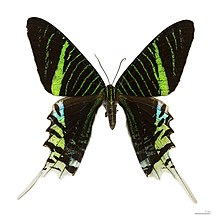The Uraniidae are a family of moths containing four subfamilies, 90 genera, and roughly 700 species. The family is distributed throughout the tropics of the Americas, Africa and Indo-Australia.[2] Some of the tropical species are known for their bright, butterfly-like colors and are called sunset moths (for example Chrysiridia rhipheus). Such moths are apparently toxic and the bright colors are a warning to predators.
| Uraniidae | |
|---|---|

| |
| Urania leilus | |
| Scientific classification | |
| Domain: | Eukaryota |
| Kingdom: | Animalia |
| Phylum: | Arthropoda |
| Class: | Insecta |
| Order: | Lepidoptera |
| Superfamily: | Geometroidea |
| Family: | Uraniidae Blanchard, 1845 |
| Subfamilies | |
| Synonyms | |
The family Uraniidae contains both diurnal and nocturnal species. The day-flying species are usually more strikingly colored and vibrant than the nocturnal ones. Many diurnal species also have iridescent scales and multiple tails, which often led them to be mistaken for butterflies. In sharp contrast, the nocturnal species are generally small, pale-colored insects. The Uraniidae are similar to the geometer moths, to which they are related, but a different wing veining pattern distinguishes them.[2]
References
edit- ^ "Epiplemidae". Global Biodiversity Information Facility. Retrieved 2023-03-22.
- ^ a b Carter, David, Eyewitness Handbook to Butterflies and Moths (1992) pp. 190–191; Dorling Kindersley/New York, NY
Further reading
edit- Minet, J. and Socble, M.J. (1999). The Drepanoid/Geometroid Assemblage. pp. 301–329 in Kristensen, N.P. (Ed.). Lepidoptera, Moths and Butterflies. Volume 1: Evolution, Systematics, and Biogeography. Handbuch der Zoologie. Eine Naturgeschichte der Stämme des Tierreiches / Handbook of Zoology. A Natural History of the phyla of the Animal Kingdom. Band / Volume IV Arthropoda: Insecta Teilband / Part 35: 491 pp. Walter de Gruyter, Berlin, New York.
External links
edit- Media related to Uraniidae at Wikimedia Commons